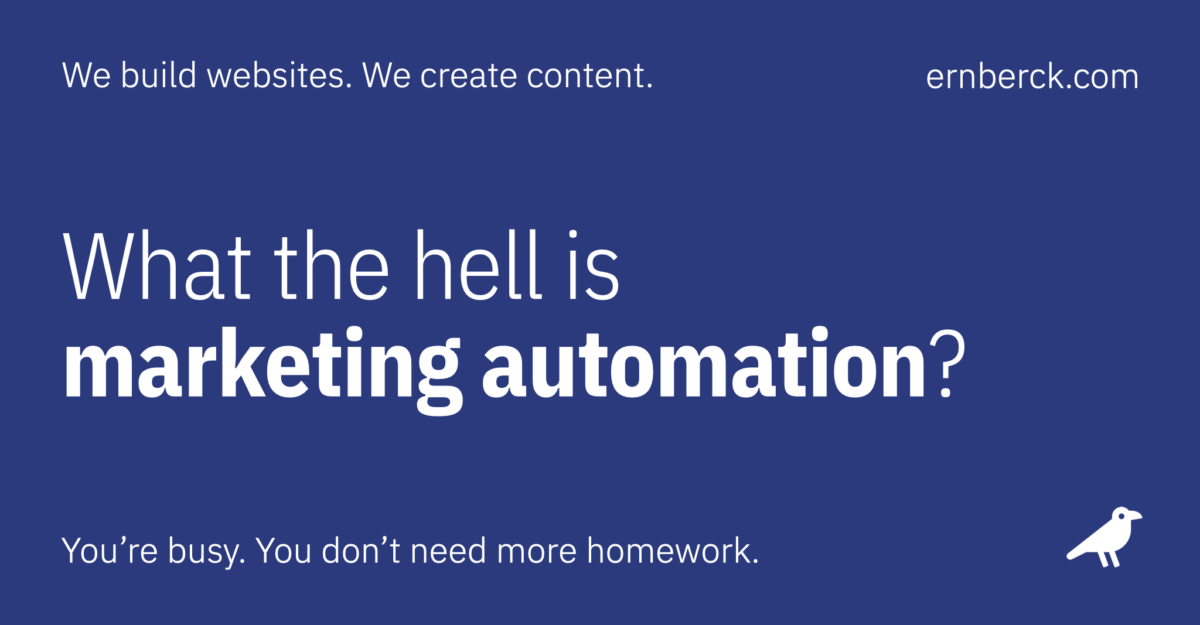Marketing automation enables businesses to deliver timely, relevant, and personalized content to their audience — Increasing efficiency, improving customer relationships, and driving revenue growth.
What is marketing automation?
Marketing automation refers to the use of technology platforms to automate and streamline various marketing tasks and processes. The goal is to enhance efficiency, optimize workflows, and deliver personalized experiences to customers or prospects.
Marketing automation typically involves using online software tools to automate mundane and repetitive tasks, gather data, analyze customer behavior, and execute targeted marketing campaigns.
How does marketing automation work?
As mentioned above, marketing automation performs a variety of functions to streamline and optimize marketing systems. Here’s an overview of how marketing automation works:
Overall, marketing automation enables businesses to deliver timely, relevant, and personalized content to their audience. This can help increase efficiency, improve customer relationships, and drive revenue growth. However, it’s important to use marketing automation strategically and thoughtfully to maintain a genuine connection with customers and prospects.
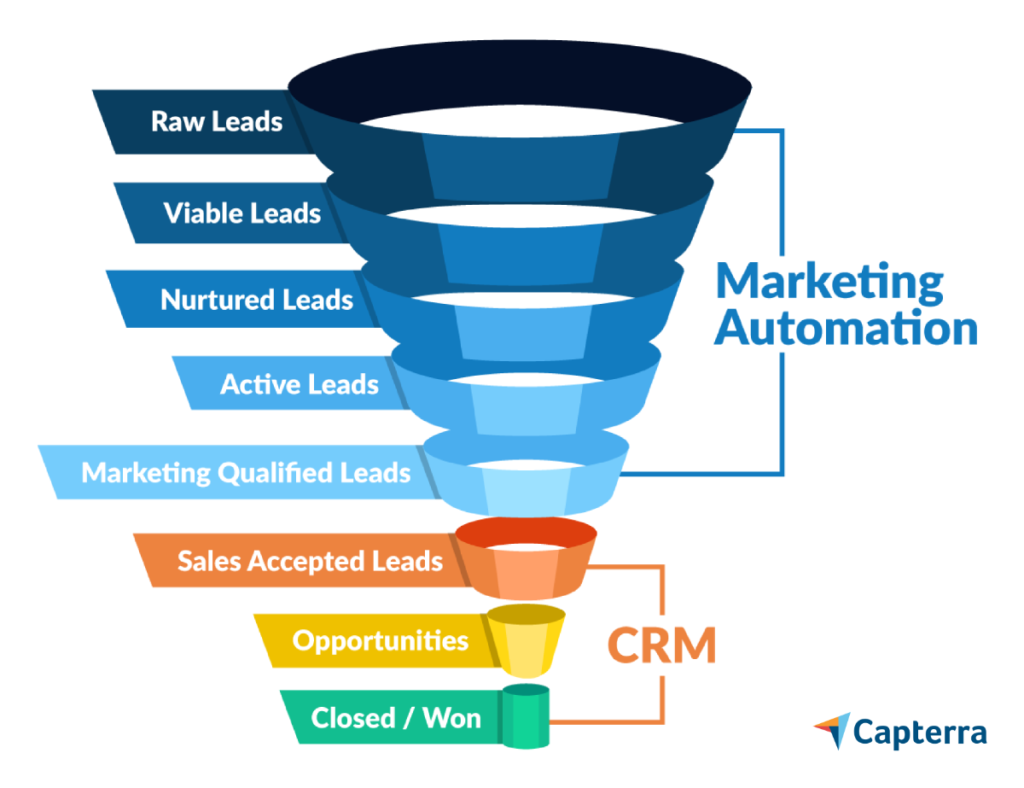
Does marketing automation replace CRM and email marketing?
While a marketing automation platform offers a wide range of features and capabilities, there are still distinct benefits to using both a customer relationship management (CRM) system and an email marketing platform.
First, lets review all three systems:
Marketing automation platform
- Manages complex workflows and automation sequences.
- Segments and targets leads based on behaviors and interactions.
- Provides lead scoring and tracking of user engagement.
- Enables personalized content delivery across multiple channels.
- Offers advanced analytics and reporting on campaign performance.
Customer relationship management (CRM) system
- Focuses on managing and tracking customer interactions and relationships.
- Provides a comprehensive view of customer data, history, and touchpoints.
- Facilitates sales pipeline management and lead-to-customer conversion.
- Helps sales teams manage customer communications and follow-ups.
- Supports customer support and post-purchase interactions.
Email marketing platform
- Specializes in managing and sending email campaigns.
- Offers email list management and segmentation.
- Provides email template design and customization.
- Tracks email open rates, click-through rates, and deliverability.
- May have specific tools for A/B testing and optimizing email content.
Here are some reasons why it’s beneficial to have all three systems:
While a marketing automation platform offers powerful capabilities, integrating it with a CRM and an email marketing platform can create a well-rounded and comprehensive approach to managing customer interactions, nurturing leads, and executing successful marketing campaigns.
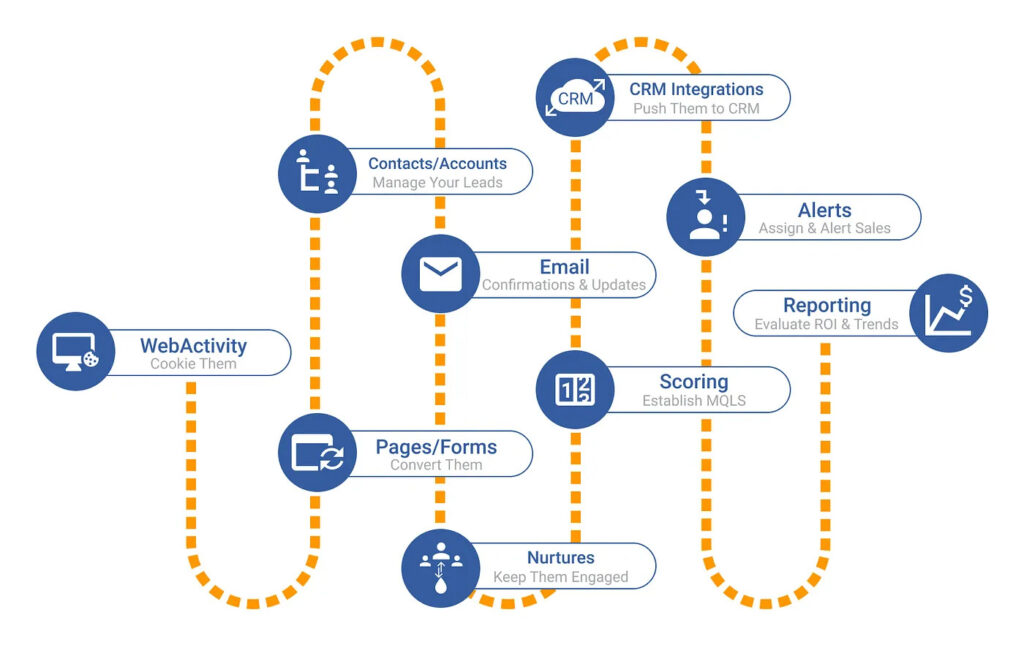
Benefits of marketing automation
Marketing automation can offer a bunch of benefits to your business by streamlining processes, improving customer engagement, and driving growth. Here’s what marketing automation can do for your business:
While marketing automation offers significant advantages, it’s important to approach its implementation thoughtfully. Define your goals, develop a clear strategy, and ensure that automation enhances — rather than replaces — the human touch in your customer interactions.
Examples of marketing automation
The following examples showcase how marketing automation can streamline processes, deliver personalized experiences, and enhance customer engagement at various stages of the customer journey.
Welcome email series
When a new subscriber signs up for your newsletter, a marketing automation platform can automatically send a series of welcome emails over a set period. These emails can introduce your brand, provide valuable content, and encourage further engagement.
Abandoned cart recovery
If a customer adds items to their shopping cart but doesn’t complete the purchase, marketing automation can send a series of reminder emails with incentives or personalized recommendations to encourage them to finalize the transaction.
Drip campaigns
A lead nurturing campaign can be set up to send a series of educational and informative emails to new leads over time. As the leads engage with the content, the automation platform can adjust the subsequent messages based on their behavior.
Birthday and anniversary offers
Marketing automation can trigger personalized emails with special offers or discounts to customers on their birthdays or anniversaries of signing up.
Dynamic customization
Automation can dynamically personalize the content of an email based on the recipient’s preferences, behavior, or purchase history. For example, an ecommerce company might show personalized product recommendations.
Re-engagement campaigns
If subscribers haven’t engaged with your emails for a certain period, marketing automation can trigger a re-engagement campaign with targeted content to win back their interest.
Event registration and follow-up
For a webinar or event, automation can handle registration confirmation emails, reminders, and post-event follow-ups — streamlining the entire event communication process.
Social media scheduling and posting
Marketing automation tools can schedule and publish social media posts across various platforms, saving time and ensuring consistent messaging.
Post-purchase upsells
After a customer makes a purchase, marketing automation can send follow-up emails suggesting complementary or related products, potentially increasing the average order value.
Lead source tracking
Marketing automation can track where leads are coming from (social media, website, referral, etc) and adjust messaging accordingly.
Feedback and surveys
After a customer makes a purchase or interacts with your brand, automation can send surveys to gather feedback, helping you improve your products and services.
Note: Keep in mind that successful marketing automation requires careful planning, segmentation, and ongoing optimization to achieve the desired outcomes.
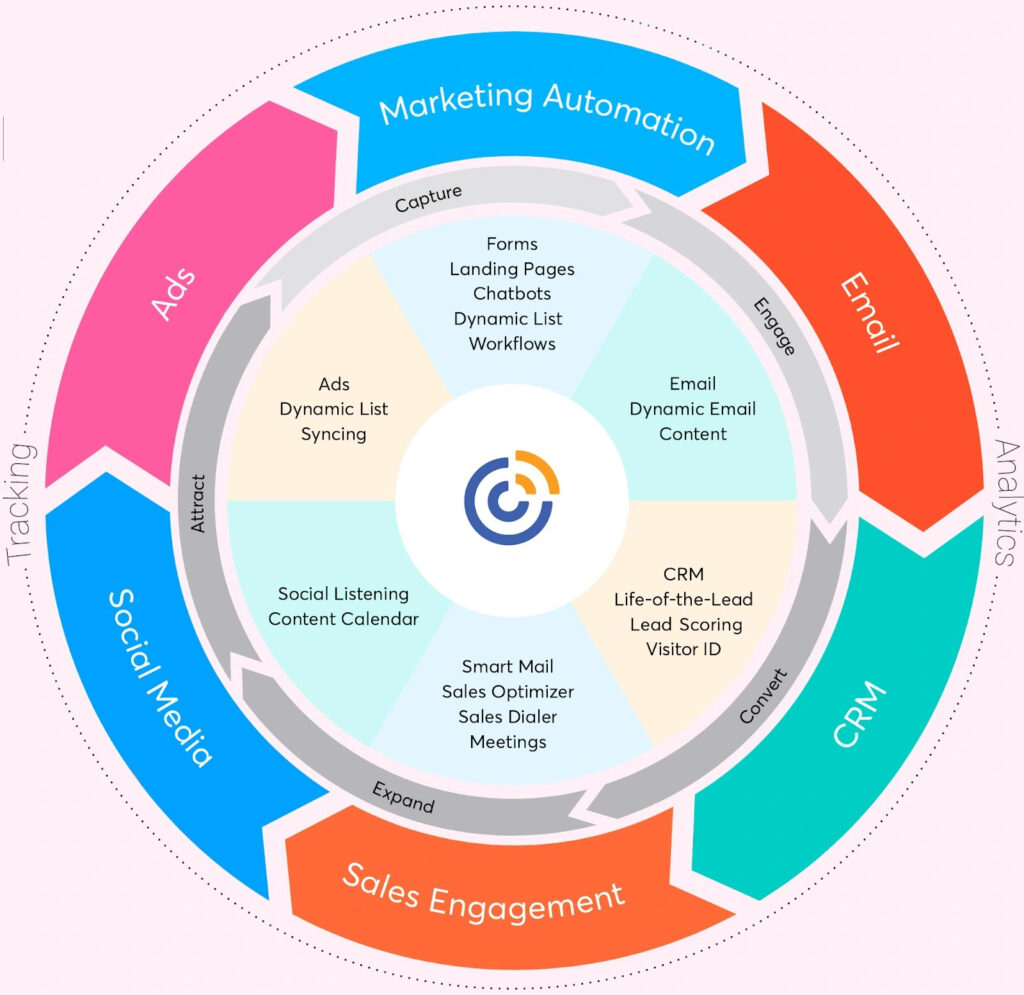
Is marketing automation hard to implement?
The difficulty of implementing marketing automation can vary depending on factors such as the complexity of your marketing processes, the size of your business, the level of integration required, and your team’s familiarity with marketing technology. Here are some considerations:
Despite these potential challenges, many businesses find that the benefits of marketing automation far outweigh the initial difficulties. Once properly set up, marketing automation can significantly improve efficiency, lead generation, customer engagement, and overall marketing effectiveness.
Take it slow
To make your marketing automation implementation a bit smoother, consider these steps:
Ultimately, while there may be a learning curve and challenges, the potential benefits of marketing automation in terms of time savings, improved customer relationships, and increased revenue can make the effort worthwhile.
How much does marketing automation cost?
Marketing automation usually doesn’t come cheap. As a very general guide, you’ll pay anywhere from $200 to $2,000 per month, depending on what platform you choose, and whether or not you’re getting help from a marketing agency.
Costs can vary widely based on several factors, including the size of your business, the complexity of your marketing needs, the features you require, and the specific features you choose. Here are some factors to consider when evaluating the cost of marketing automation:
To determine the cost of marketing automation for your business, you should:
- Assess your current marketing needs and future growth plans.
- Research and compare different marketing automation platforms to find one that meets your requirements.
- Request pricing quotes and detailed information from platform providers.
- Consider the scalability, flexibility, and value that each platform offers.
- Calculate the potential ROI based on the benefits you expect to achieve.
Remember that while marketing automation can involve upfront costs, the benefits it provides in terms of time savings, improved customer relationships, and increased revenue can make it a valuable investment for your business.
Popular marketing automation platforms
There’s a bunch of marketing automation platforms that offer a range of features and capabilities. No big surprise, they also vary widely in cost and complexity. Here are some of the most popular and well-known platforms (in no particular order).
HubSpot
HubSpot offers an all-in-one inbound marketing and sales platform that includes marketing automation, CRM, email marketing, social media management, and more. It’s known for its user-friendly interface and comprehensive suite of tools.
Marketo (Adobe Marketo Engage)
Marketo is a robust marketing automation platform that provides features for lead management, email marketing, campaign management, and analytics. It’s often used by medium to large enterprises.
Pardot (Salesforce Pardot)
Pardot is a B2B marketing automation solution offered by Salesforce. It focuses on lead generation, nurturing, and sales alignment, and is tightly integrated with the Salesforce CRM.
Eloqua (Oracle Eloqua)
Eloqua is an enterprise-level marketing automation platform that offers features such as lead scoring, campaign management, dynamic content personalization, and advanced analytics.
ActiveCampaign
ActiveCampaign is known for its email marketing automation capabilities, as well as features for CRM, lead scoring, behavioral tracking, and marketing automation workflows.
Mailchimp
Originally known for email marketing, Mailchimp now offers marketing automation features, including audience segmentation, email workflows, and ecommerce integrations.
Keap
Formerly known as Infusionsoft, Keap is designed for small businesses and offers features for CRM, marketing automation, lead management, and ecommerce.
GetResponse
GetResponse provides email marketing, marketing automation, landing page creation, and webinar hosting, making it a comprehensive solution for online marketing.
Autopilot
Autopilot focuses on visual marketing automation workflows, making it easy to create and manage complex campaigns without coding.
Drip
Drip is known for its ecommerce automation capabilities, allowing businesses to create targeted campaigns for online stores.
Ontraport
Ontraport offers CRM, marketing automation, email marketing, and ecommerce features, primarily targeting small to medium-sized businesses.
SharpSpring
SharpSpring provides marketing automation, CRM, social media management, and analytics tools suitable for agencies and businesses of various sizes.
Campaign Monitor
Campaign Monitor offers email marketing automation and features for creating visually appealing email campaigns.
Act-On
Act-On provides marketing automation, lead nurturing, and CRM integration for businesses seeking a comprehensive solution.
Note: It’s important to evaluate these platforms based on your specific business needs, budget, technical requirements, and the level of support and training you require. Many platforms offer free trials, demos, and documentation to help you make an informed decision. Keep in mind that the best marketing automation platform for your business will depend on your unique goals and challenges.
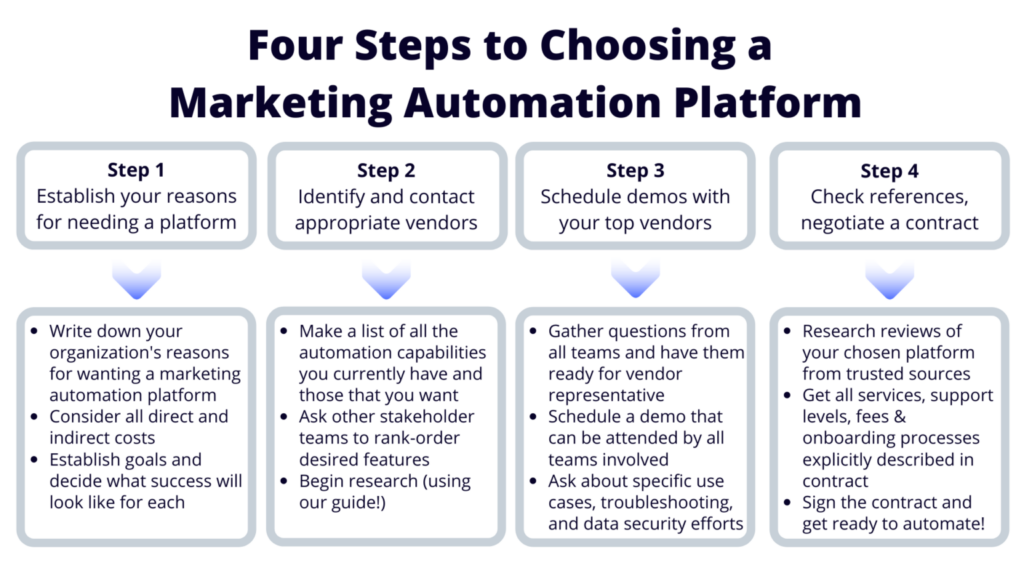
Marketing automation for small businesses
Automation platforms can be suitable for many small businesses, but the choice should be made based on your specific needs, budget, and goals. While some marketing platforms are geared toward larger enterprises with complex marketing needs, there are options available that are well-suited for small businesses.
If you run a small business, here are some factors to consider:
Some marketing automation platforms that are suitable for small businesses include:
Remember that the success of using a marketing automation platform for your small business depends on how well you understand your goals, your target audience, and your ability to use the platform effectively. It’s important to thoroughly research and test different platforms to find the one that aligns with your needs and helps you achieve your marketing objectives within your budget.
Summary
Marketing automation is a powerful technology that enables businesses to deliver timely, relevant, and personalized content to their audience.
Benefits of marketing automation include increased efficiency, better targeting, improved customer engagement, and more informed decision-making. It allows marketers to create more personalized and relevant experiences for their audience, ultimately leading to higher conversion rates and revenue growth.
However, it’s important to use marketing automation strategically and thoughtfully to maintain a genuine connection with customers and prospects. It requires careful planning and ongoing optimization to strike the right balance between automation and maintaining a human touch to ensure that communication remains authentic and meaningful.
Related
- Content marketing still works
- How to promote your website
- How inbound marketing really works
- What is email marketing
Sources
Research
- Assisted by ChatGPT
